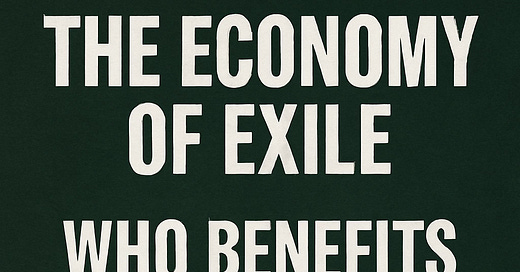CH 8 - The Economy of Exile: Who Benefits from Keeping People Disposable
From Criminal by Design: The Architecture of Harm in U.S. Immigration
Listen to the podcast
Return to the Criminal by Design: The Architecture of Harm in U.S. Immigration Hub
Immigrants—especially the undocumented—aren’t excluded from the American economy.
They’re embedded in it. Essential to it. Exploited by it.
They harvest our food, clean our homes, build our houses, care for our children and grandparents. But in the eyes of the system, they are disposable. Useful—until they are not.
This isn’t accidental. It’s a model of economic dependence built on political denial.
"They are essential enough to pick your food—but not to be seen."
Labor Without Rights
The U.S. economy relies on undocumented labor:
Over 50% of all U.S. farmworkers are undocumented. (Source: U.S. Department of Agriculture, 2023)
Tens of thousands work in meatpacking, construction, landscaping, and eldercare
These jobs are often dangerous, underpaid, and excluded from workplace protections
Undocumented workers contribute billions in taxes—often without any eligibility for the benefits those taxes fund.
"They’re good enough to generate revenue, but not to receive safety, insurance, or legal status."
The Threat of Disposability
What happens when undocumented workers speak up?
Retaliation.
ICE raids.
Firing without recourse.
Eviction from employer-provided housing.
Employers benefit from the fear. The state benefits from the silence.
"We don’t deport everyone—we just deport the inconvenient."
This is the economy of exile: build profit on the backs of fear, and extract value from people too afraid to protest.
Section 3: THX Breakdown — Profiting from Fear
Utilities abused:
Resource Utility: Maximum labor, minimum investment
Security: Conditional, unstable, revocable
Clarity: Legal status is kept ambiguous to preserve control
Value: Humanity is secondary to productivity
PERMAH damage:
Meaning: People live only in survival mode
Achievement: No ladder to long-term growth
Relationships: Disconnection replaces dignity
Admiration Equation collapse:
No Skill is honored—only labor extracted
No Goodness in suppressing those who sustain us
No Awe in human resilience under threat
No Gratitude from the society that depends on them
"Fear is the fertilizer for this economy. And silence is its most traded currency."
Final Reflection and Challenge
This isn’t just a labor issue. It’s a moral reckoning. We cannot claim to build a just society while treating essential people as if their value ends at the edge of a paycheck.
"An economy that runs on fear is always at war with justice."
Call to Action: Share this. Especially with those who benefit from this labor—consumers, business owners, lawmakers. Ask: What would it take to treat essential workers as essential humans?
CH9: Obedience to What?
When the Law Conflicts with Justice
Obeying injustice is not virtue. It’s complicity.




